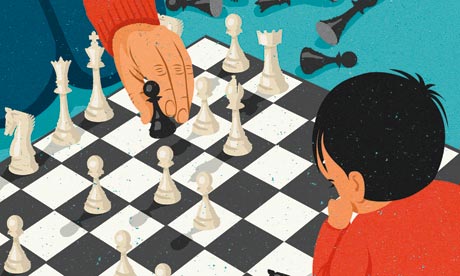
Anyone born in the 70s to parents of an even slightly knit-your-own-muesli disposition must have encountered the horror of "non-competitive games". The intention was excellent – to show that vanquishing other people needn't be life's guiding value – but non-competitive games fall short in one crucial respect: they're no fun. (Sorry, Woodcraft Folk, but you know it's true.) Recently, by contrast, I played Gears Of War: Judgment on a friend's Xbox, performed atrociously and had a brilliant time.
This wouldn't surprise the Danish-born video games scholar Jesper Juul. As he points out in his fascinating new book The Art Of Failure, games embody a paradox: we prefer to experience success rather than failure; we enjoy games; yet games involve repeatedly exposing oneself to failure. Juul quotes an interview with the wife of one committed player: "It's easy to tell what games my husband enjoys the most. If he screams, 'I hate it, I hate it, I hate it' then I know he will finish it and buy version two."
This puzzle has echoes of the "tragedy paradox", with which thinkers have wrestled for centuries. Why are we drawn to fictional works that prompt us to feel unpleasant emotions? During a performance of Othello, philosopher Gregory Currie observes, you "want" Desdemona to live – but a director who tweaked the script to let that happen would be in for awful reviews. Is this because the sadness we feel isn't really sadness? Is it because the negative emotion leads to compensatory positive ones? (One recent study involved showing the film Atonement to hundreds of students; the researchers argued that it led them to reflect on their own relationships, and feel gratitude.) Or, most bafflingly, could it be that we're "ahedonic", seeking something other than happiness? What would that even mean, if "happiness" is just a label for whatever it is we're seeking?
Games, whether Gears Of War or Scrabble, give the paradox an extra twist: because they're interactive, you can't pretend you're simply learning from the experiences of others, or feeling grateful that you are better off than them. "When you fail in a game," Juul writes, "it really means that you were in some way inadequate." Of course, failing in a game is partly fake: in Gears Of War, I wasn't really being blasted to death by robot locusts intent on eradicating humanity. But it's also partly real: I really did fail to coordinate my brain, my hands and the controller sufficiently well to keep playing.
Why should this feel such fun? Juul gives no easy answer – though, actually, the most interesting thing about the "paradox of failure" isn't its cause, but its ramifications. It's a reminder (to phrase it paradoxically) that we don't really want what we want; that a perfectly successful life wouldn't in fact be perfect. Discover the optimal route through a game, and pleasure evaporates: try playing noughts and crosses against a four-year-old, making no allowances for age, and see how long that stays fun.
In some mysterious way, the continuing possibility of failure is what makes games worth playing. And life worth living? As the self-help writer Susan Jeffers liked to say, if you were magically offered the chance to know exactly how the rest of your life would unfold, you'd be a fool to accept, even if what you learned was 100% positive. Afterwards, living that life would feel like a kind of death: Game Over.
oliver.burkeman@theguardian.com
• Follow Oliver on Twitter.

